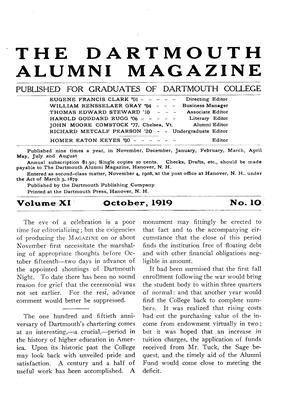The following statement was prepared by Professor Gerould, Chairman of the Committee on Graduate Instruction at Dartmouth:
"It will be of interest to Dartmouth graduates to know that the British Universities are not only extending a cordial welcome to students from the United States and Canada, but by common agreement are offering the degree of Doctor of Philosophy to American and other 'research students' after a two years' course of study. Dartmouth is upon the list, approved by the Association of American Universities, of colleges and universities in the United States from any of which the various universities of the United Kingdom are ready to receive applications for matriculation.
''That the two great conservative universities of Cambridge and Oxford, overgrown with ancient traditions and bound by formal regulations, should have joined with such youthful institutions as the University of Bristol, which was founded in 1909, in granting the doctor's degree to foreign students on equal terms, is a remarkable example of cooperation under the stimulus of these stirring times.
"Seven of these younger institutions, all established during the last quarter of a century, are associated with the ancient English and Scotch universities in this movement. Announcements in more or less detail regarding opportunities for research at Cambridge, Edinburgh, Birmingham, Bristol, Durham (including colleges at Newcastle-upon-Tyne), Leeds, and Liverpool, are already in the hands of our Committee on Graduate Instruction, and more information regarding other British universities is forthcoming. (It is the wish of the Committee to make this material as widely known among our graduates as it well deserves to be, though space limitations forbid more than a casual mention of it in this issue.
"An attractive feature of this new arrangement is the provision made at the smaller universities whereby the candidate, after a residence of one year, may obtain premission to complete his work, under the direction of the same institution, at some other approved place.
"The exigencies of the war have developed with great rapidity and to a high degree of perfection the branches of science upon which depend the industries, and nowhere has this growth been more rapid than in the group of new universities in the industrial centers of the north of England.
"At Leeds, for example, one finds peculiar opportunities for study and research in the textile and leather industries, in color chemistry and dyeing, in coal mining, as well as in the usual lines of engineering, pure science and arts. At Liverpool one finds a department of Naval Architecture organized under the Faculty of Engineering, while under the Faculties of Science and of Medicine other departments associated with shipping occur. Thus the Faculty of Science includes a department of Oceanography and a Tidal Institute; and the Faculty of Medicine its well-known department of Tropical Medicine.
"Expenses, except at Cambridge and Oxford, are apparently not in excess of contemporary charges at American colleges. In fact, the American student to avoid the high cost of living may well migrate to North Britain.
"It remains to be seen what effect this radical departure regarding the degree of Doctor of Philosophy will have upon graduate study in other countries. Britain now offers this degree practically upon even terms with Germany. The handicap of the foreign language removed, an American student abroad may perhaps accomplish in Great Britain as much in two years as one used to achieve in Germany in three,. though he must go well prepared to undertake active research and should have a very definite program in mind, if he expects to complete in two years a piece of work equivalent to that to which his compatriots in American universities would devote three."
 View Full Issue
View Full Issue
More From This Issue
-
 Article
ArticleREPORT OF TRUSTEES' MEETING
October 1919 -
 Article
ArticleADDRESS OF PRESIDENT HOPKINS AT THE OPENING OF DARTMOUTH COLLEGE SEPTEMBER 25, 1919
October 1919 -
 Article
ArticleSALMON P. CHASE, UNDERGRADUATE AND PEDAGOGUE
October 1919 By Charles R. Lingley -
 Article
ArticleS. A. T. C. CONTRACTS AND THE COLLEGES
October 1919 -
 Article
ArticleBIG INCREASE IN THE FACULTY
October 1919 -
 Class Notes
Class NotesNEW ENGLAND STATES
October 1919







